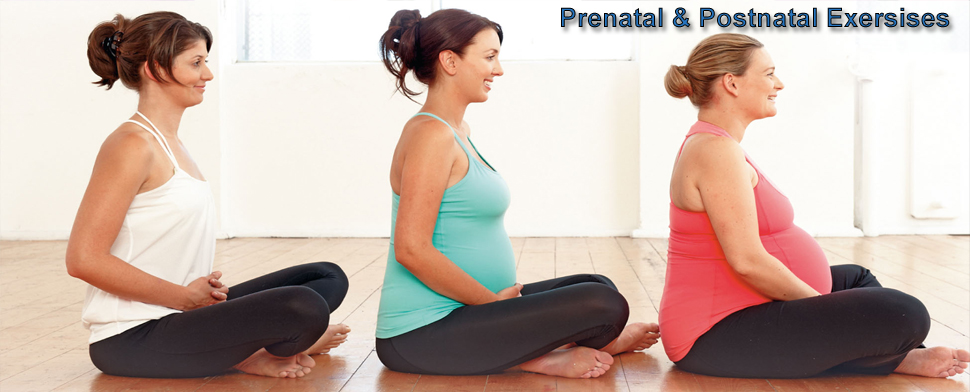|
Prenatal & Postnatal ExersisesPrenatal ExersisesYears ago, due to doctors' concern that exercise might harm a developing baby, pregnant women were discouraged from working out. The medical profession has since realized that prenatal inactivity is what actually puts moms-to-be and their babies at risk. Medical experts now agree that prenatal exercise is absolutely safe and beneficial for low-risk pregnancies. Prenatal exercise eases back pain, improves poor posture and reduces muscle soreness, all of which are caused by the shortening or lengthening of the muscles in a pregnant woman's legs, hips, butt, back and shoulders. Exercise during pregnancy increases the volume of blood your heart pumps with each beat, increasing the amount of oxygen and nutrients delivered to your baby. As long as you exercise no less than 3 hours before going to bed, working out while pregnant will help you sleep more soundly at night and help make you feel more refreshed throughout the day. Exercise during pregnancy helps to decrease constipation, digestive irregularities, varicose veins and general body discomfort. Prenatal exercise may help prevent and treat gestational diabetes.Prenatal exercise may lead to enhanced functional capacity of the placenta, which can help protect the baby by providing extra blood flow during times of stress. Women who exercise throughout pregnancy tend to have shorter labors and deliveries. Regular exercise during pregnancy leads to babies being born with less fat, but does not decrease the overall growth of the baby. Women who exercise during pregnancy have an easier time returning to their pre-pregnancy weight and size. Not only do pregnant women who work out tend to gain healthy levels of weight, but the weight comes off easier and quicker for those who exercised during pregnancy. Postnatal ExercisesRegular exercise has numerous health benefits, all of which apply equally to the new mother as at any other stage of life. These benefits include assistance with weight loss, increased aerobic fitness, social interaction and psychological wellbeing. Exercise after giving birth can also hasten recovery, and assist with muscle strength and toning. Always consult with your doctor or midwife before starting any postnatal exercise program. Whether or not you are ready to exercise depends on individual factors. For instance, you may be advised to wait until your six-week postnatal check-up. In other cases, especially if you were exercising regularly throughout your pregnancy, you may be able to return to exercise sooner than that – perhaps within the first week or two. Gentle exercise (such as walking) can generally be started as soon as comfortable after giving birth. Start when you feel up to it.Six weeks after giving birth, most of the changes that occur during pregnancy will have returned to normal. If you had a caesarean birth, a difficult birth, or complications, it may take a little longer to feel ready to start exercising. If you did not exercise during pregnancy, start with easy exercises and slowly build up to harder ones. Exercising after you have your baby can improve your physical and mental wellbeing. It can: Help restore muscle strength and firm up your body Make you less tired because it raises your energy level and improves your sense of wellbeing Promote weight loss Improve your cardiovascular fitness and restore muscle strength Condition your abdominal muscles Improve your mood, relieve stress and help prevent postpartum depression. |
Health Care Centre |


